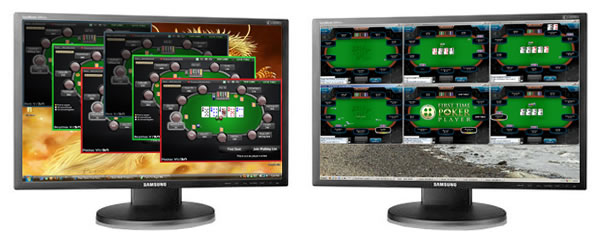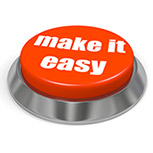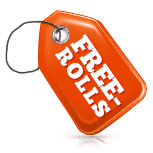Top 10 Tips For Playing Online Poker
If you thought playing online poker was simply about turning on the PC or Mac, loading up a table or three of $0.10/0.20 NLHE and fitting a few hands in between episodes of Breaking Bad, think again.
Playing successful online poker requires dedication, an attention to detail, and some careful forward planning.
So, if you’re looking to get your online poker career off to the perfect start, what things should you be looking at? Let’s take a look at 10 ways to stave off the monkey tilt just a little longer.
Whether you’re a novice starting out at the micro-stakes cash games or a seasoned pro at the upper limits, you’ll need to employ sensible bankroll management if you’re to prevail over the long term. Make sure you can afford about 50 maximum buy-ins at a single cash table, and about 20 buy-ins at the tourneys/Sit ‘n’ Gos. Handling your online bankroll well will mean you never go broke.

While messing with the big boys on the ballers’ tables might seem mighty tempting straight from the off, you probably won’t learn a great deal, other than how to lose a tonne of cash quick. So pick your limits according to your skill level – start off at the micro-stakes, and if you can comfortably and consistently crush them, consider moving up.
If you’re a Sit n Go player you’ll find the standard doesn’t change much from about $5 - $50 buy-ins, so if you have the cash you can probably look at chancing your arm at slightly higher stakes. If you find the heat too great – whatever your discipline - simply move back down to a more comfortable level.
Sensible hand selection is one of the first things you’ll learn when you start playing poker – whatever your discipline. Most, if not all, online players begin playing Texas Hold’em just playing every single hand – even rubbish like 9-2 off-suit – just to be involved in every hand. But players soon learn that folding most hands – or playing marginal hands in the right situations – is the key to a healthy poker life.
What recreational players wanting to make money at the tables will soon learn is that betting or raising with a limited set of hands is the way to go. As you improve over time you can comfortably incorporate more marginal hands into your repertoire depending on your opponents, the stage of a tournament, whether you’re playing cash or tourneys, your chip stack, table situation, and so on.

Finding the best computer kit is almost as important as finding the right online poker site. Getting the best Internet connection is a given, of course, but so is getting your hands on the best monitor you can afford. A widescreen monitor at least 24” is essential as it means you can fit many tables on-screen at once. Learning to multi-table is key to improving your volume and ultimately, improving your ROI (Return on Investment).
“Poker takes minutes to learn but a lifetime to master,” goes the rather over-worked saying. And if you are serious about improving as a player over the long-term reviewing your play is vitally important.
Taking notes on key hands you’ve been involved in is the first thing to do – just take a note of the Hand # in the corner of the game screen of any interesting hands you get involved in and you’ll be able to visit the Hand History to see the betting details (pre-flop, post-flop, showdown etc) or watch the hand from start to finish in the site’s Re-player.
By watching hands over and over with the benefit of hindsight you can spot mistakes in your play or take time to assess your opponents’ play. Then, when you come up against the same opponents again you’ll be better equipped.
Improving your play doesn’t stop at note-taking, of course: there are countless training videos and strategy articles on the web – many of them free – where you can pick and choose those relevant to your discipline. There’s really no excuse these days to be left wanting when it comes to improving at poker.

There’s no doubt that online poker players in 2026 are much better than they were 6 or 7 years ago – particularly at the upper levels – and the number of novices coming through at the bottom levels isn’t as high as it used to be.
Hunting out the fish is certainly much harder than is used to be, but that doesn’t mean there aren’t poker sites that have their fair share of bad players. New poker rooms which advertise heavily for business, poker sites attached to big sports betting sites and rooms that focus their lobbies on the micro-stakes games – all of these places are ideal for finding fishy players who are just dying to donate their bankrolls to you.
And while we’re on the subject of utilizing the web to improve your play, consider investing in some invaluable tracking software. Buying a dedicated piece of HUD (Heads-up Display) kit will set you back around $100 but over the long-term you can easily make that back in extra profits.
HUDs like PokerTracker or Hold’em Manager “sit” on top of your poker table and give you information on your opponents’ play, tracking stats like the percentage of hands they fold pre-flop, how much they bet pre-flop, and so on. Some sites, have anonymous players so it’s harder to a) take notes, and b) use tracking software, while other sites have banned the use of these devices altogether, so if you’re thinking of investing in a program, make sure your favorite site allows it.
One rule that applies just as well to live poker as it does the online game is to lay off the alcohol - completely. With a crate of Bud in the fridge at home it can be too easy just to crack open another can while grinding the cash tables.
But even after a couple of drinks your judgment can be severely impaired and you can feel invincible. Going for a two-outer to send that chump on life-tilt? Why the hell not; trying out a few gamble moves when you should be playing sensible, ABC poker? It can be too easy, especially when you start to get bored of the oftentimes monotonous nature of playing online poker for hours on end.

If you think poker begins and ends with No Limit Texas Hold’em, think again. While most land-based casinos are likely to offer NLHE at a few stakes – both in cash games and tournaments – online sites boast games in everything from Pot Limit, No Limit or straight Limit Hold’em, Omaha, Stud, Razz, and more unusual variants like 2-7 Triple Draw and Badugi.
Not only do these fringe variations give you the chance to try something new, they give you the chance to fleece the fish who are trying out new forms of the game themselves. If you can learn a few simple strategies at the lesser-known games, it will put you in a much better position to make an easy profit.

The beauty of online poker is that you can start your real-money poker journey with absolutely no bankroll at all. Most big sites will hold daily freerolls that cost nothing to enter and usually offer a couple of thousand dollars as prize money.
The play is usually fast and loose – they cost nothing to enter, remember – but freerolls are a good way of trying out a few plays and bumping up your balance. Check out poker forums online and some of the bigger poker magazines – they normally run exclusive freerolls which give away cash or live tournament seats.
Sitemap | About & Contact | Disclaimer | Privacy

PokerSites.com is the only dedicated review site selected as a member of the Interactive Gaming Council.
